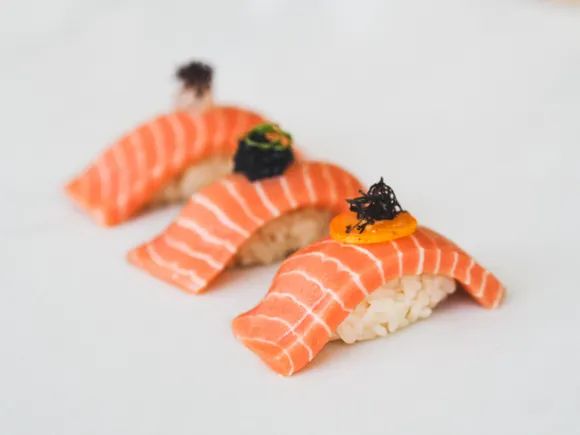Exciting News:
- The FDA has granted clearance to San Francisco-based Wildtype to introduce its lab-grown salmon in the U.S., marking the first approval for a cultivated seafood product by the agency.
- Following a successful pre-market safety assessment, the FDA issued a “no questions” letter affirming that Wildtype’s cultivated fish is deemed “as safe as comparable foods produced by other methods.”
- Wildtype has made its salmon available at a high-end restaurant in Portland, Oregon. The fish is created by cultivating cells from live Pacific salmon, which are then harvested and combined with plant-based ingredients to replicate the appearance of traditional fish fillets.
Insightful Details:
Wildtype joins the ranks as the fourth cultivated meat and seafood producer to receive FDA approval, signaling the growth of a burgeoning industry that has encountered resistance from traditional farming and agricultural sectors.
Several states, including Nebraska and Mississippi, have recently prohibited the sale of lab-grown meat, adding to the restrictions already in place in Florida and Alabama since 2024. Indiana has also implemented a temporary ban on cell-cultured meat, while numerous other states are contemplating similar measures, as reported by the Council of State Governments Midwestern Office.
Despite opposition from traditional meat producers, advocates like Wildtype argue that this technology can complement existing agricultural practices by addressing the demand for animal protein amidst limited land and water resources.
The U.S. leads with 36 cultivated meat companies in 2024, according to a report from the Good Food Institute. While lab-grown meat and fish are not yet available in U.S. retail outlets, the industry faces challenges in scaling production amidst fundraising difficulties.
However, there is significant potential for lab-grown products, especially as consumers show interest in reducing meat consumption without completely eliminating it. Flexitarians, who primarily follow a vegetarian diet but occasionally consume meat or fish, account for up to 15% of the U.S. population, as highlighted by the Food Institute.
Collaborating with traditional meat companies could be key to advancing the industry, as evidenced by investments from major players like Cargill and Tyson Foods in cultivated meat. JBS is also constructing a lab-grown meat facility in Brazil.
Wildtype plans to expand the availability of its cultivated salmon to four more restaurants in the next four months and seeks additional partnerships to raise consumer awareness, as mentioned in a recent press release. While other cultivated meat producers have introduced their products at restaurants, some have scaled back operations — Upside Foods’ cultivated chicken was recently removed from a San Francisco eatery after the end of a partnership.
With increasing regulatory scrutiny at the state level, more cultivated meat producers are voicing their concerns. Wildtype has actively opposed state measures to restrict the sale of cultivated meat, with its co-founders testifying against the Florida bill in 2024.
Looking ahead, Wildtype envisions technology and innovation as crucial tools in addressing global health and environmental challenges. The company emphasizes the importance of driving meaningful behavioral change to promote sustainability and quality of life.

